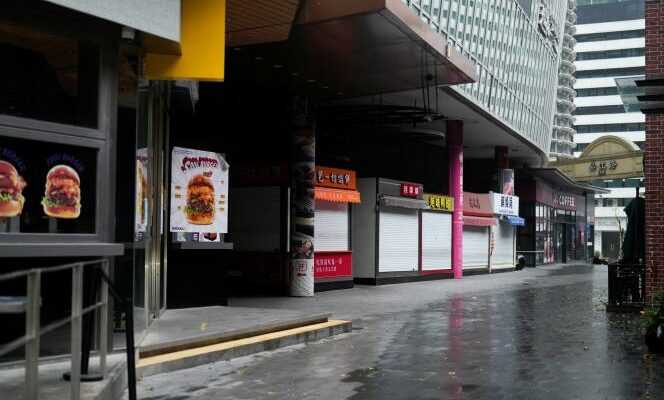This week, for four days, Mr. Wang, 34, slept under a bridge. “On Monday, they found cases in my dormitory: they took around twenty people, positive or contact cases. We all live together. So they sealed the whole building. Me, I was outside, explains this delivery man who rides the empty streets of Shanghai on a scooter. He chose not to return home so he could continue to earn a living. “Right now, most of the orders I receive are to deliver medicines from pharmacies,” he indicates. After a few nights out, he managed to slip into his dorm on Thursday, April 14, late in the evening, and came out very early in the morning to avoid prying eyes.
Since the end of March, Shanghai has imposed strict confinement on its 25 million inhabitants. While large companies continue to pay their employees, the self-employed, daily or pieceworkers and small businesses do not have a safety net. To limit social damage, China announced in early March a package of 2,500 billion yuan (360 billion euros) in load reductions for this year. On March 29, Shanghai went further with 140 billion yuan (20 billion euros) for local businesses. But smaller companies often benefit less from these measures.
“We’re closing, that’s all”
“To pay taxes, you still have to earn money! », emphasizes Ying Shen, patroness of At JoJo’s, two French restaurants installed in the city center for a year and a half, and closed at the end of March. In addition to the reductions in charges, consumer aid was limited to vouchers for a few hundred yuan (a few tens of euros). Wang Weiwei, 28, another delivery man, is not allowed to work: “Like 99% of the delivery people I know”, he specifies. He has lost his income since his residence in Pudong district was locked down on March 22. “Usually I earn between 12,000 and 15,000 yuan a month, working hard. There, I don’t earn anything and I had to spend 5,000 yuan between my rent and food. » When he is released, he says, he will end his years as a migrant and return to settle in his hometown of Suqian in Jiangsu, in the north of the country.
Shanghai is far from the only city affected by these restrictions: in recent months, outbreaks have multiplied across the country.
Shanghai is far from being the only city affected by these restrictions: in recent months, outbreaks have multiplied across the country, forcing local authorities to chain confinements. Xi’an, capital of Shaanxi province in central China, has just been partially confined again on Friday, April 15, after the discovery of 43 cases. The city had undergone an extremely strict confinement between December 2021 and January 2022. A blow for Mr. Wu, owner of a local Chinese hot pot restaurant: “This is the fifth time that we have been confined, he sighs. We lost 2 months at the start of 2020 and, in 2021, we had confinements in July, then in October, December and January. It lasted 40 days in all! Each time, our turnover disappears: some can sell to take away, but this is not possible for our menu. We’re closing, that’s all. »
You have 12.15% of this article left to read. The following is for subscribers only.
